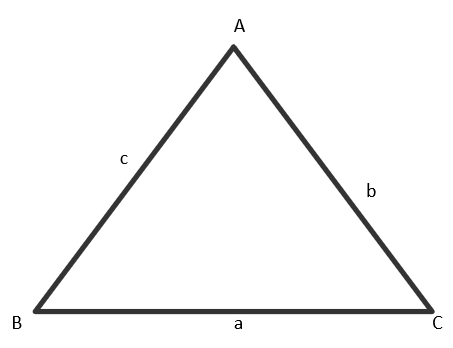
If we have \[\cos A + \cos C = 4{\sin ^2}\dfrac{1}{{\text{2}}}B\] , the sides $a,b,c$ of the triangle are in G.P.
(A) True
(B) False
Answer
611.1k+ views
Hint: If the sides $a,b,c$ of the triangle are in G.P (Geometric Progression) then we have to prove that \[{b^2} = ac\].
Complete step-by-step solution -

Given that \[\cos A + \cos C = 4{\sin ^2}\dfrac{1}{{\text{2}}}B\]
We know that \[\cos A + \cos C = 2\cos \left( {\dfrac{{A + C}}{2}} \right)\cos \left( {\dfrac{{A - C}}{2}} \right)\]
So, the given equation becomes as
\[2\cos \left( {\dfrac{{A + C}}{2}} \right)\cos \left( {\dfrac{{A - C}}{2}} \right) = 4{\sin ^2}\dfrac{1}{2}B\]
Since sum of the angles in a triangle equal is to
i.e. $
A + B + C = \pi \\
A + C = \pi - B \\
$
So, the equation becomes as
\[2\cos \left( {\dfrac{{\pi - B}}{2}} \right)\cos \left( {\dfrac{{A - C}}{2}} \right) = 4{\sin ^2}\dfrac{1}{2}B\]
\[
2\cos \left( {\dfrac{\pi }{2} - \dfrac{B}{2}} \right)\cos \left( {\dfrac{{A - C}}{2}} \right) = 4{\sin ^2}\dfrac{1}{2}B \\
\\
2\sin \left( {\dfrac{B}{2}} \right)\cos \left( {\dfrac{{A - C}}{2}} \right) = 4{\sin ^2}\dfrac{1}{2}B \\
\]
Cancelling \[\sin \dfrac{B}{2}\] on both sides we get
\[\cos \left( {\dfrac{{A - C}}{2}} \right) = 2\sin \dfrac{1}{2}B\]
By Mollweide Rule,
\[\dfrac{{\cos \left( {\dfrac{{A - C}}{2}} \right)}}{{\sin \left( {\dfrac{1}{2}B} \right)}} = \dfrac{{a + c}}{b}\]
So, the equation becomes as
\[
\dfrac{{a + c}}{b} = 2 \\
a + c = 2b \\
\]
Thus, the sides \[a,b,c\] of the triangle are not in G.P (Geometric Progression).
Hence, the answer is False .
Note: Here the sides \[a,b,c\] of the triangle are in A.P (Arithmetic Progression). Since the sides are in \[a + c = 2b\]. We need to remember the trigonometric identities which are very essential to solve this problem.
Complete step-by-step solution -

Given that \[\cos A + \cos C = 4{\sin ^2}\dfrac{1}{{\text{2}}}B\]
We know that \[\cos A + \cos C = 2\cos \left( {\dfrac{{A + C}}{2}} \right)\cos \left( {\dfrac{{A - C}}{2}} \right)\]
So, the given equation becomes as
\[2\cos \left( {\dfrac{{A + C}}{2}} \right)\cos \left( {\dfrac{{A - C}}{2}} \right) = 4{\sin ^2}\dfrac{1}{2}B\]
Since sum of the angles in a triangle equal is to
i.e. $
A + B + C = \pi \\
A + C = \pi - B \\
$
So, the equation becomes as
\[2\cos \left( {\dfrac{{\pi - B}}{2}} \right)\cos \left( {\dfrac{{A - C}}{2}} \right) = 4{\sin ^2}\dfrac{1}{2}B\]
\[
2\cos \left( {\dfrac{\pi }{2} - \dfrac{B}{2}} \right)\cos \left( {\dfrac{{A - C}}{2}} \right) = 4{\sin ^2}\dfrac{1}{2}B \\
\\
2\sin \left( {\dfrac{B}{2}} \right)\cos \left( {\dfrac{{A - C}}{2}} \right) = 4{\sin ^2}\dfrac{1}{2}B \\
\]
Cancelling \[\sin \dfrac{B}{2}\] on both sides we get
\[\cos \left( {\dfrac{{A - C}}{2}} \right) = 2\sin \dfrac{1}{2}B\]
By Mollweide Rule,
\[\dfrac{{\cos \left( {\dfrac{{A - C}}{2}} \right)}}{{\sin \left( {\dfrac{1}{2}B} \right)}} = \dfrac{{a + c}}{b}\]
So, the equation becomes as
\[
\dfrac{{a + c}}{b} = 2 \\
a + c = 2b \\
\]
Thus, the sides \[a,b,c\] of the triangle are not in G.P (Geometric Progression).
Hence, the answer is False .
Note: Here the sides \[a,b,c\] of the triangle are in A.P (Arithmetic Progression). Since the sides are in \[a + c = 2b\]. We need to remember the trigonometric identities which are very essential to solve this problem.
Recently Updated Pages
Master Class 10 Computer Science: Engaging Questions & Answers for Success

Master Class 10 General Knowledge: Engaging Questions & Answers for Success

Master Class 10 English: Engaging Questions & Answers for Success

Master Class 10 Social Science: Engaging Questions & Answers for Success

Master Class 10 Maths: Engaging Questions & Answers for Success

Master Class 10 Science: Engaging Questions & Answers for Success

Trending doubts
The draft of the Preamble of the Indian Constitution class 10 social science CBSE

Who gave "Inqilab Zindabad" slogan?

Why is there a time difference of about 5 hours between class 10 social science CBSE

What is the minimum age for fighting the election in class 10 social science CBSE

Write an application to the principal requesting five class 10 english CBSE

My birthday is June 27 a On b Into c Between d In class 10 english CBSE




